
Although software synths are outrageously powerful and affordable, getting hands-on with their hardware counterparts can reward a different workflow. A synthesizer used to be an extortionate investment – a Yamaha DX7 would set you back $1,995 upon its initial 1983 release which, adjusted for inflation, is over $5,000 today. But music technology companies have managed to make that sum much smaller today. Yamaha’s modern revival of the DX7, the dinky Reface DX, will cost you just $300. That sounds a lot less terrifying than the 1983 price tag.
Korg is a renowned affordable synth specialist. Behringer is recreating legendary synths with a legendary price. Roland has created compact, modern versions of its analogue classics. All these companies, and many more, understand that the modern producer can’t always afford to break the bank on a sweet new synth. To show you what we mean, we’ve compiled a list of our favourite hardware synths that sit below $600.
The best synthesizers under $600 at a glance:
- Teenage Engineering Pocket Operator
- Dreadbox Nymphes
- PWM Malevolent
- ASM Hydrasynth Explorer
- IK Multimedia UNO Synth
- Behringer Pro-800
- Korg Nu:Tekt NTS-1
- Behringer TD-3-MO
- Korg Minilogue XD
- Modal Electronics COBALT5S 5-voice
- Roland JU-06A
- Arturia MicroFreak
- Roland/Studio Electronics SE-02
- Behringer Neutron
- 1010music Nanobox Lemondrop
- Yamaha Reface DX
- Make Noise 0-COAST
- Moog Mavis
Teenage Engineering Pocket Operator
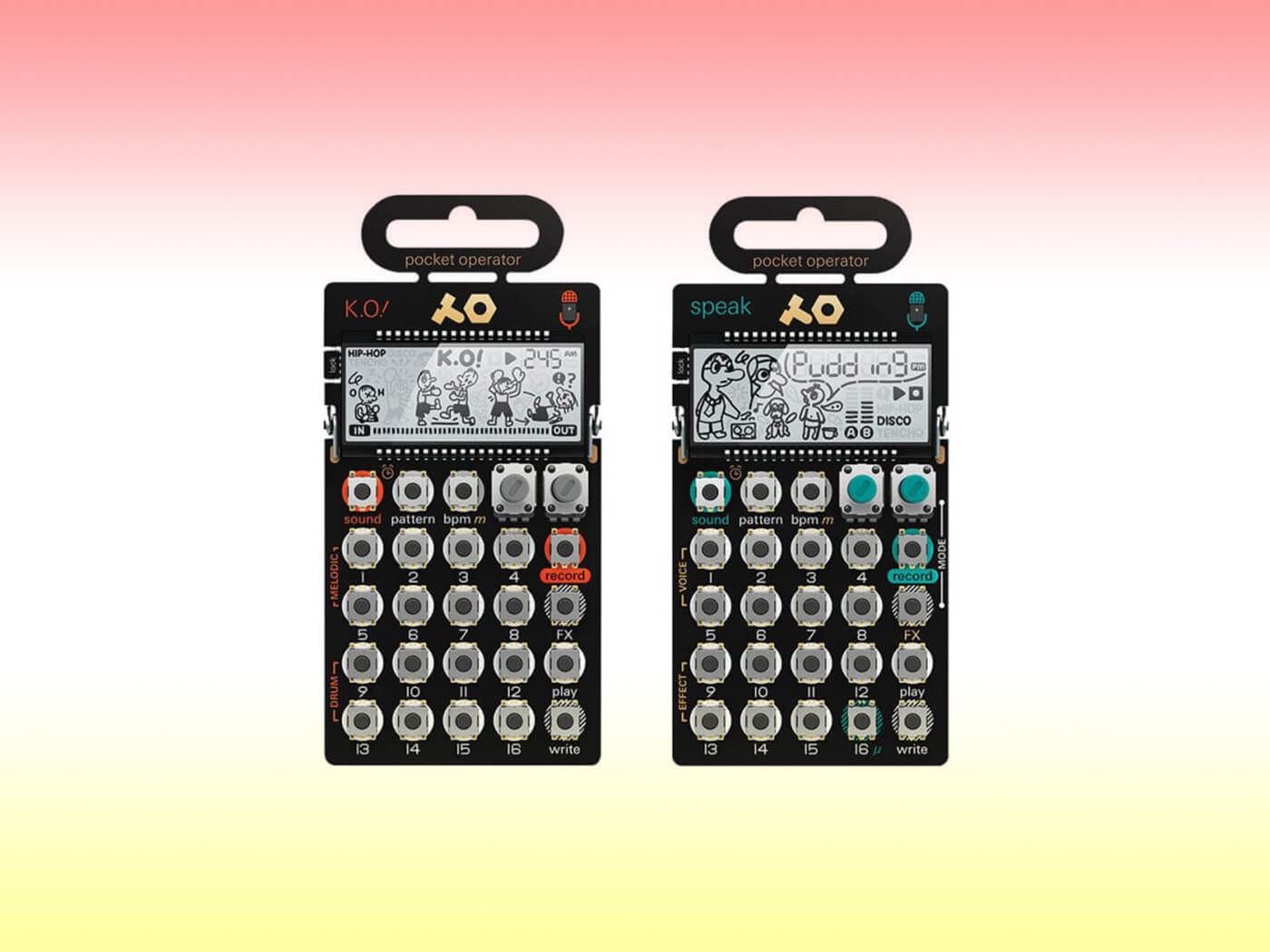
[products ids=”6OnBZzCoX1ysyIatusIbef”]
Teenage Engineering is a brand that oozes design excellence. The Swedish brand rarely misses the mark with innovative, beautiful and downright cute products that inspire – although not so innovative on the desk table front. While Pocket Operators aren’t as flashy as some of TE’s other more lavish products like the OP-1 Field and its miniature TX-6 mixer, they’re capable of some serious sounds.
Each Pocket Operator is a nifty, calculator-sized gadget with a screen that will take you back to the days of Tamagotchi and early Pokémon games. The Pocket Operator comes in several different forms with varying sounds, such as Sub, Rhythm, Arcade, Factory and more. If you’re looking to buy something cheap and fun to use, a TE Pocket Operator is a good choice.
Features:
- Multiple real synthesizer engines
- 15 sounds + micro drum
- 16 punch-in effects
- 16 punch-in arpeggio and chord play styles
- 16 pattern chaining
- Price: £89
Dreadbox Nymphes
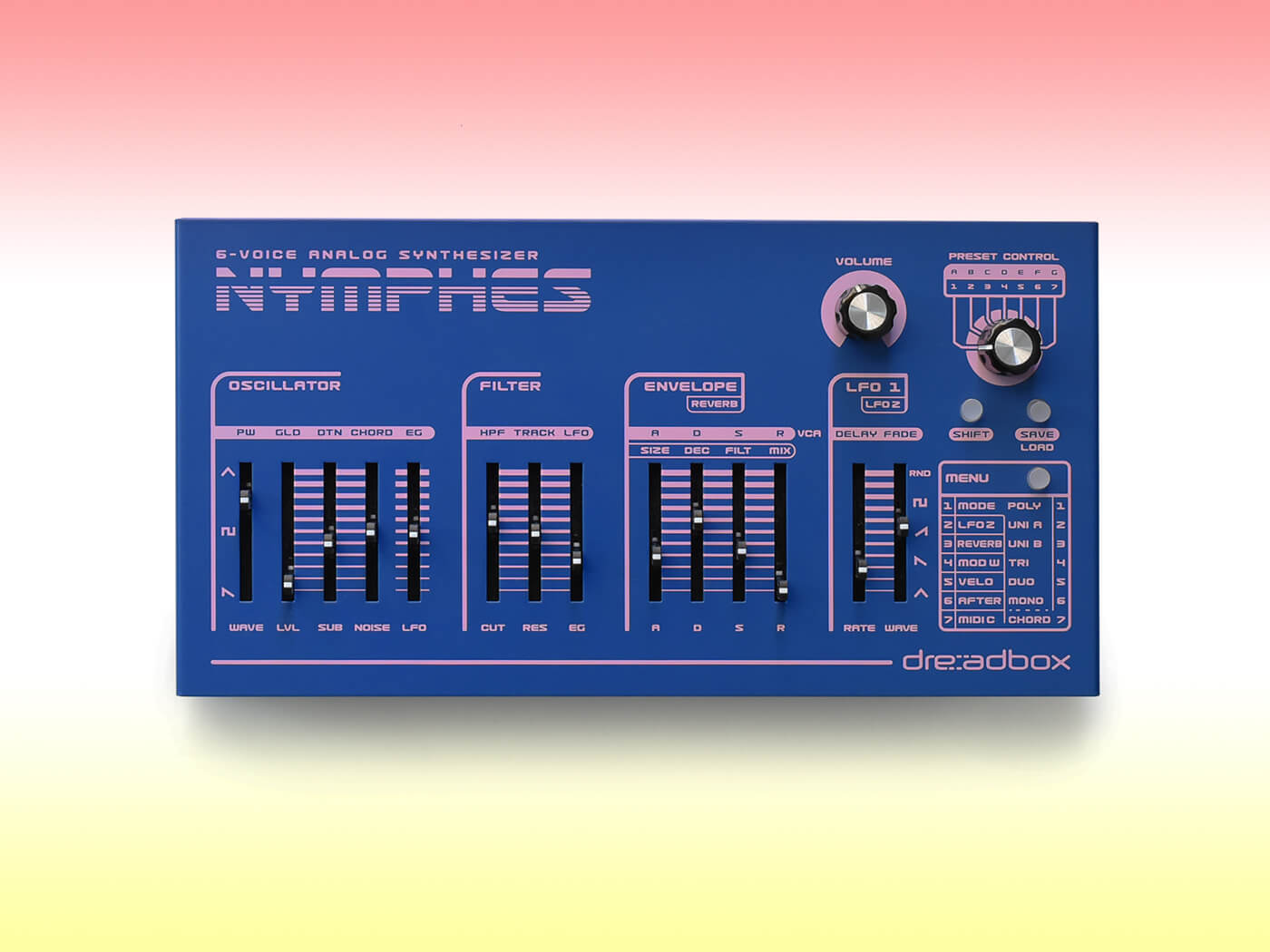
[products ids=”6N0nSpevC7oEwOFGAyd4v9″]
Dreadbox’s Nymphes is a quirky synthesizer ideal for producers looking for an analogue sound akin to a Roland Juno synth. While its functions can be a fiddle at first, the warm sounds it produces is a sufficient reward for your toils. For such an affordable price, you get MIDI control over every parameter, a lush-sounding reverb and a weighty slab of complex sound design options.
In our review of Nymphes, we said: “Nymphes offers multiple sonic personalities, with rasping basses, ethereal pads, spiky, wonky melodies, blunt sounds perfect for sequencing and a host of options for electronic percussion. Its sound is deep, broad and versatile but, just as significantly, it’s not awash with flashy gimmicks trying to impress you.”
Features:
- All analogue, six-voice structure
- Digital Reverb with a spring-like, unusual quality
- Multiple Play Modes
- Bus power and MIDI Connectivity over USB
- Separate MIDI breakout cable included
- Fully controllable via MIDI CC
- Map-able Velocity, Mod Wheel and Aftertouch routings per patch
- 49 presets and 49 user patches
- Price: $599
PWM Malevolent
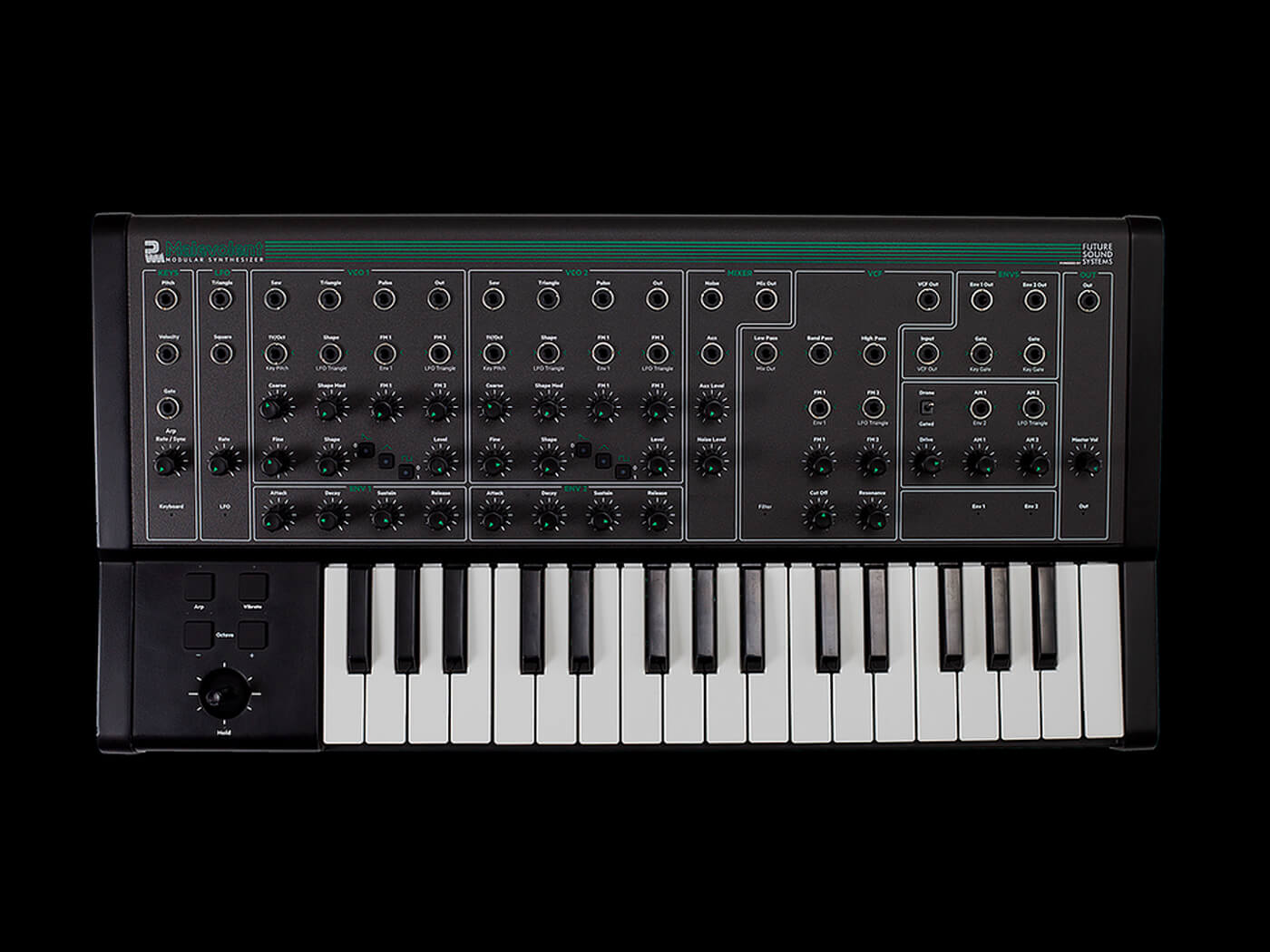
[products ids=”5ZbTrxTMFy2DKXUQw4Az29″]
British brand PWM debuted its Malevolent analogue synth in 2021. Malevolent features an analogue signal path with two VCOs, two envelopes, and a multi-mode 2-pole VCF. Its USP lies in modular-style patching, featuring 19 inputs and outputs for versatile routing. With features like a 32-note keyboard, arpeggiator, and vibrato effect, this popular synth offers a diverse sonic palette.
Features:
- Price: $528
- Modular-style patching with 19 inputs/outputs
- 32-note keyboard with velocity sensitivity
- Onboard arpeggiator and vibrato effect
- Multi-function joystick for pitch bends and portamento
Ashun Sound Machines Hydrasynth Explorer
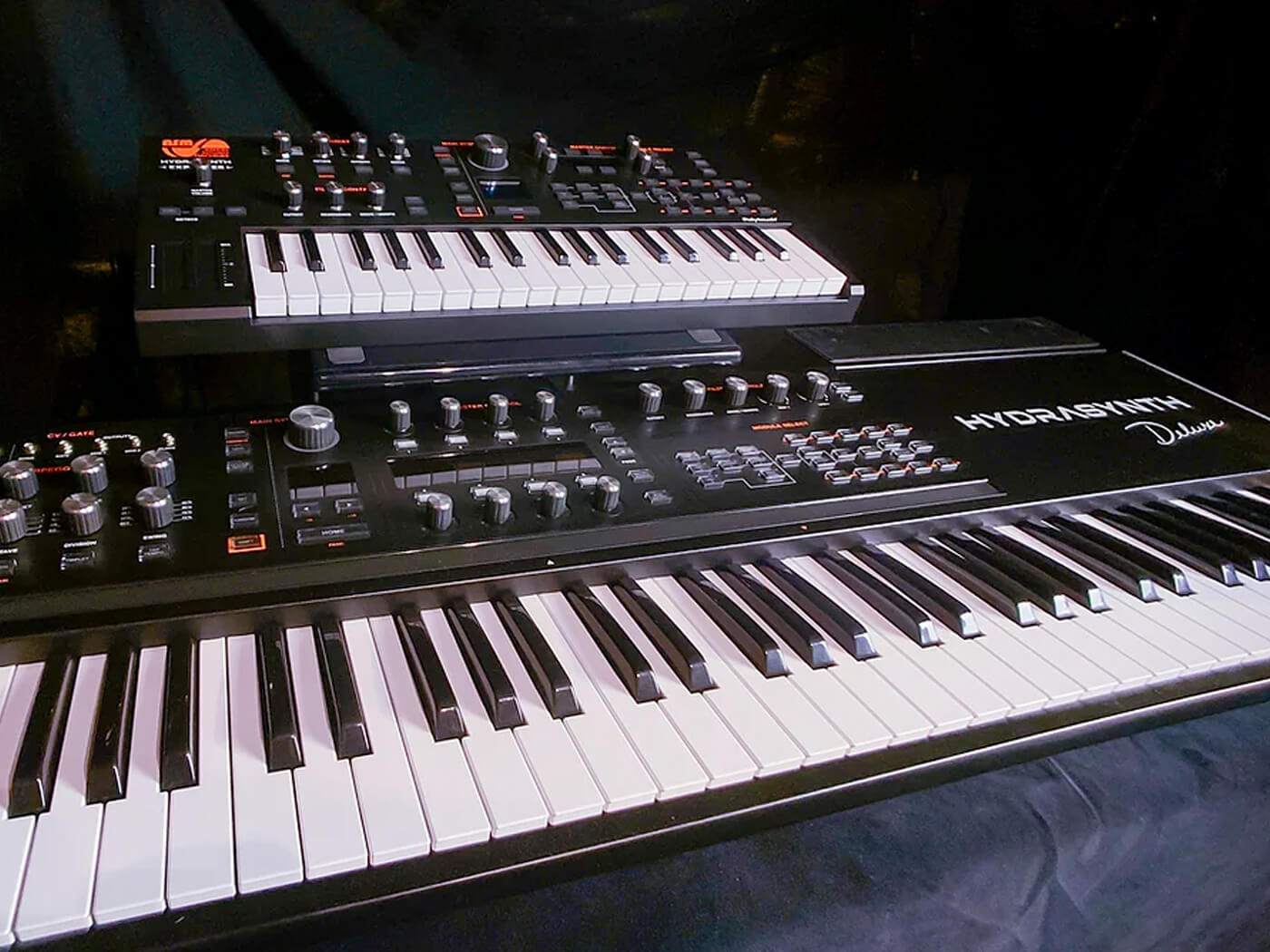
[products ids=”1oSkHBvx1FaZQ36lMC2Nk0″]
ASM’s Hydrasynth Explorer condenses the features of its desktop and keyboard counterparts into a more compact format. With an 8-voice digital synth engine featuring three oscillators per voice and a 37-note keyboard with polyphonic aftertouch, it offers versatility in a portable package. It’s also battery-powered, meaning you can take it virtually anywhere.
Features:
- Price: $599
- 8-voice digital synth engine with three oscillators per voice
- 37-note keyboard with polyphonic aftertouch
- Can be powered by an adaptor or eight AA batteries
- Compatible with previous Hydrasynth patches
IK Multimedia Uno Synth
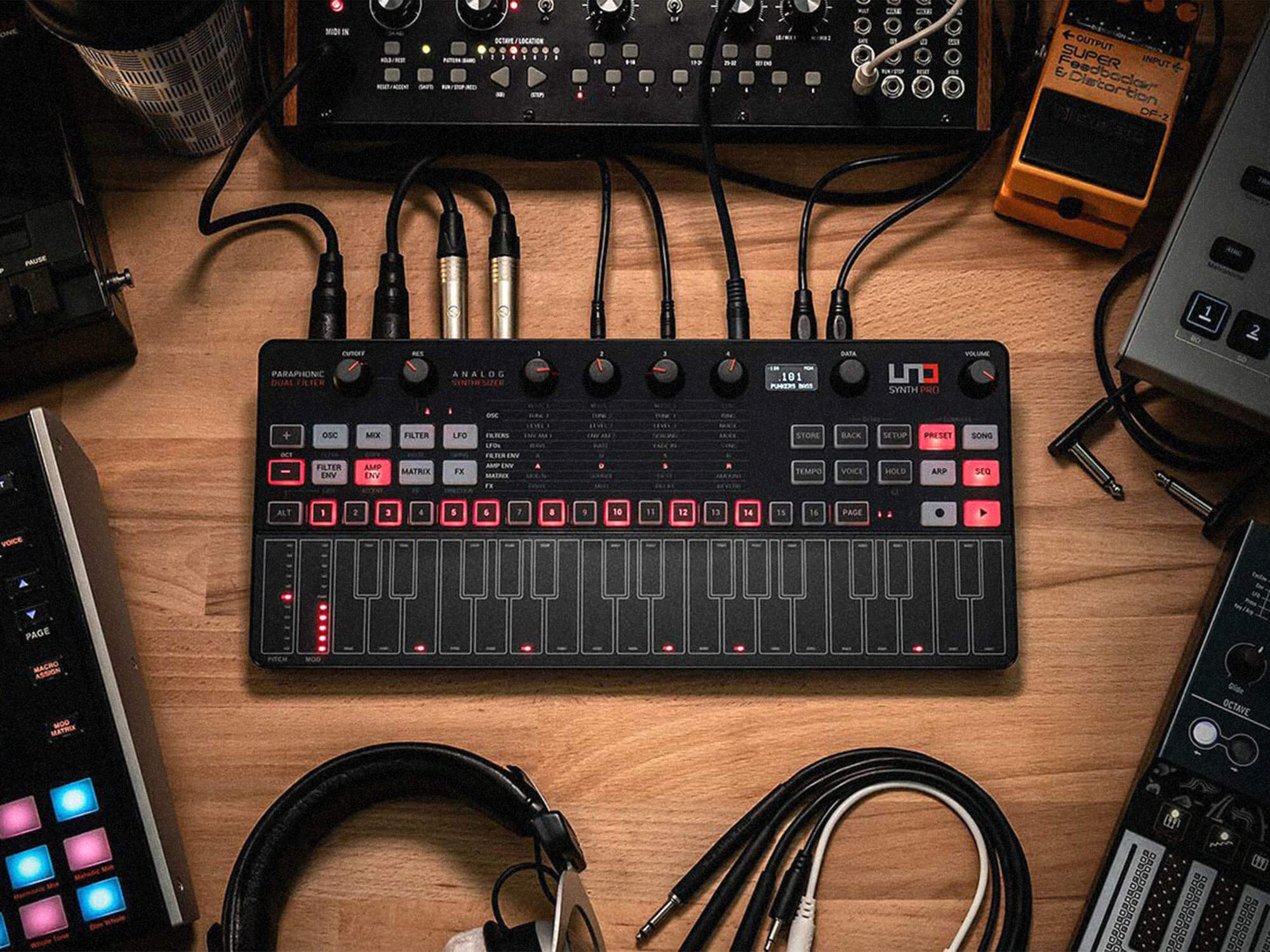
[products ids=”4DHybO1D0DYy93G1UVM6XX”]
IK Multimedia’s Uno Synth is a more modern take on synthesis than many others, with a slick interface that nonetheless controls a powerful monophonic analogue synthesiser. There are 2 VCOs with continuously variable waveshape, noise generator, resonant multimode VCF and VCA, and a 2-pole multimode OTA-based sweepable analogue resonant multimode filter with LPF, HPF, BPF modes.
The 40 onboard buttons provide easy access to all controls, including an onboard multi-touch 27-note chromatic and scale keyboard with 13 scales. In terms of I/O you get USB and hardware MIDI via a mini jack, audio line in for daisy chaining other instruments, USB or battery power options and a software editor running on Mac, PC or iOS to manage and tweak your sounds.
Features
- Monophonic analog synth
- 2 VCOs with continuously variable waveshape
- Multiple filter models
- 27 note chromatic scale keyboard
- USB and hardware MIDI
- USB or battery power
- Price: €230
Behringer Pro-800
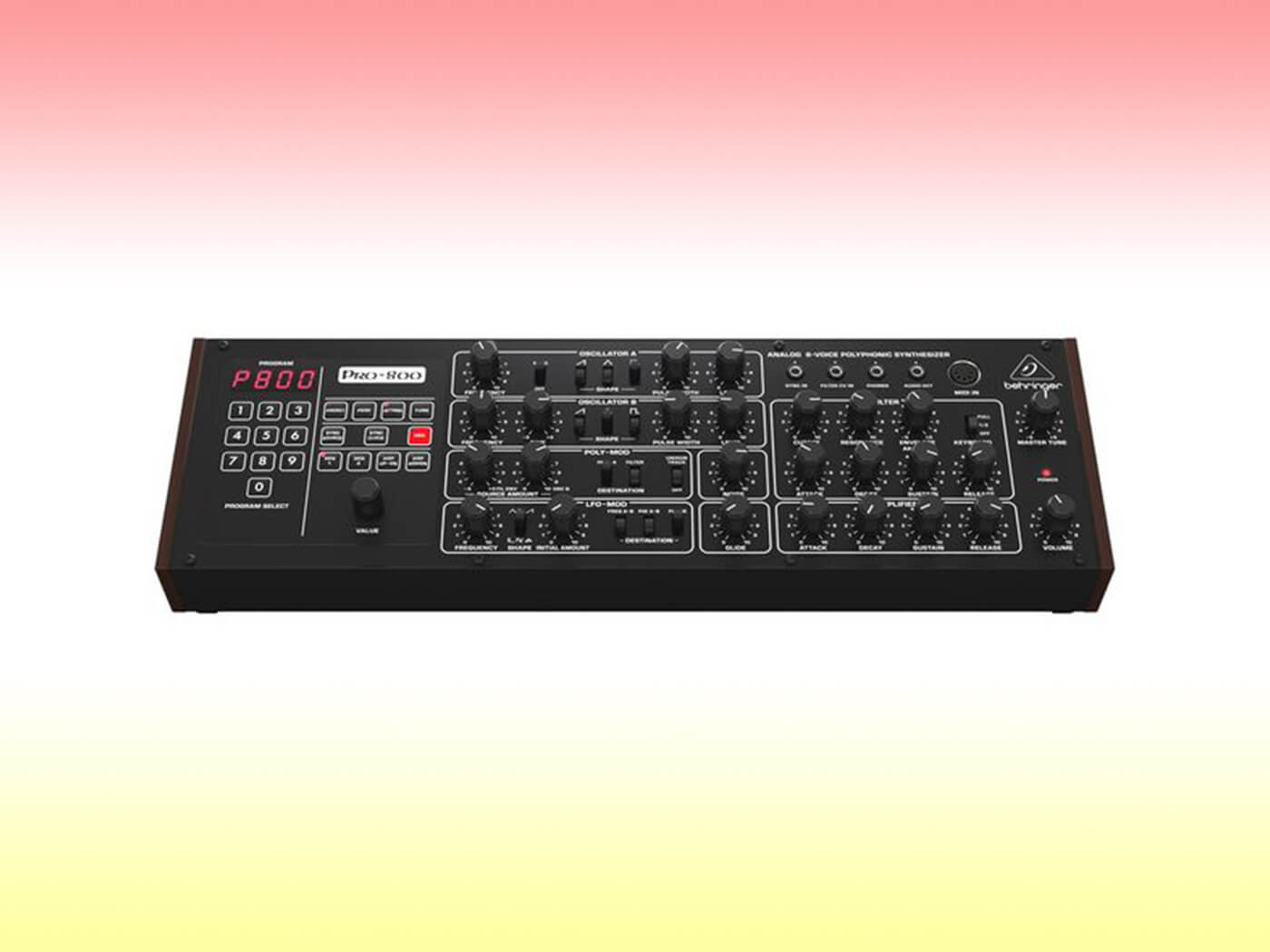
Behringer’s polyphonic Eurorack synth, the Pro-800, is notably inspired by the renowned Sequential Prophet-600.
The Pro-800 boasts 16 oscillators and 8-voice polyphony, emulating the 1982 synth’s analogue sound. It offers modern features without losing its classic character. Ideal for both studio and performance setups, it covers rumbling basses and scorching leads with iconic and contemporary appeal.
Features:
- 8 analogue voices, 2 VCOs per voice
- Dedicated LFO with six waveforms
- Additional noise generators, one said to be from “ultra-rare Japanese models”
- Built-in polyphonic track sequencer
- VCA overdrive for additional harmonics
- MIDI CC control for all parameters
- 400 preset slots
- Price: $399
Korg Nu:Tekt NTS-1
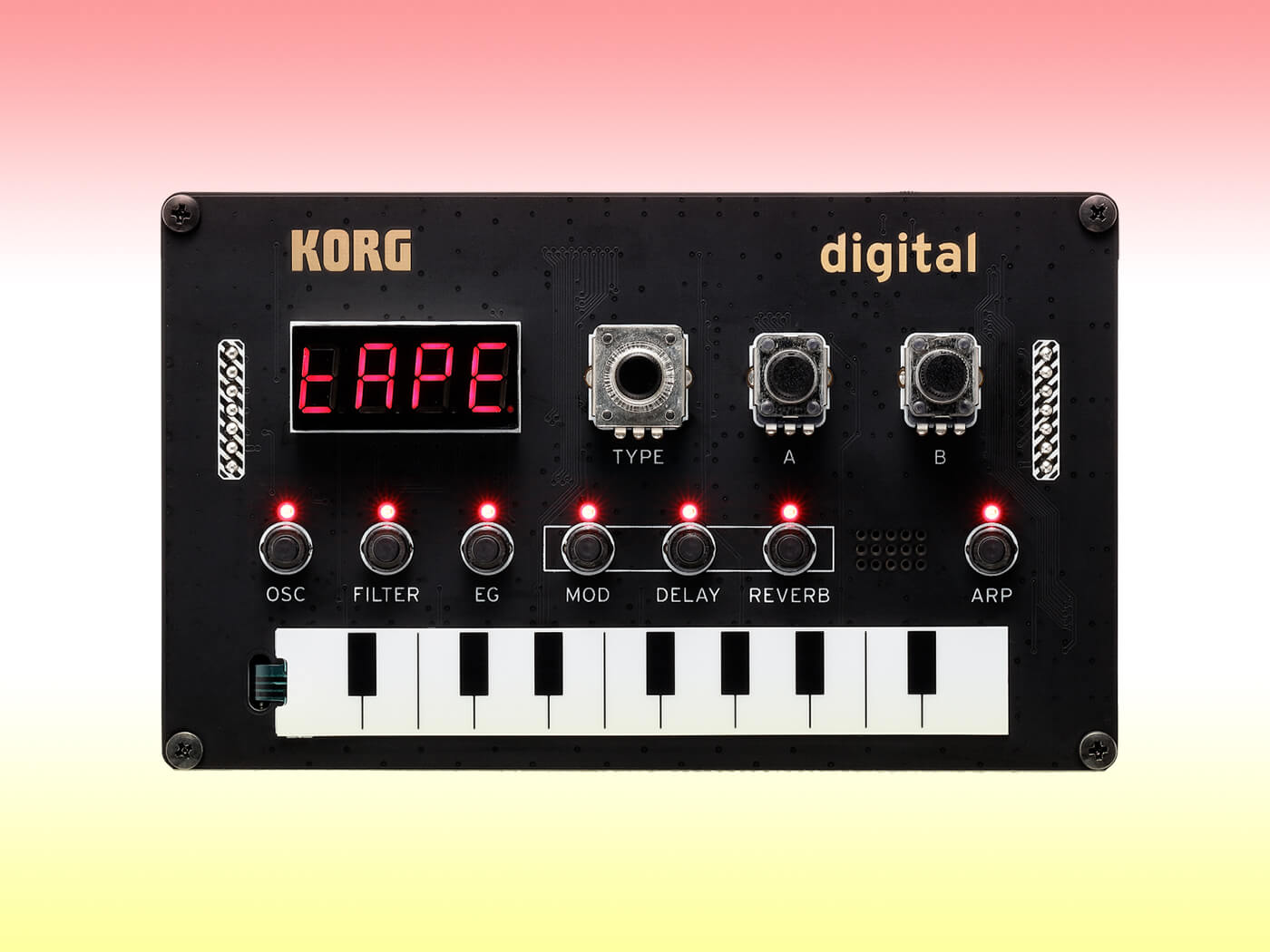
[products ids=”6tYoPRghQPieWkSQVN5uuS”]
Ever wanted to build your own synth? Korg’s delightful little digital mini synth comes as a set of parts, with tools included for you to piece it together. It takes about 30 minutes to get it fully functional and you’ll feel pretty good when that oscillator starts working. The Nu:Tekt NTS-1 is also surprisingly powerful, with 16 oscillator types, five delay and reverb algorithms and a multi-mode filter.
In our review of the Nu:Tekt NTS-1, we said: “For £99, the Nu:Tekt NTS-1 is an absolute steal. Once you get into the effects, you can quickly make massive sounds from mundane beginnings, and this little beast has enough quirks to keep you entertained for a long time. Despite its miniature stature and similarly small price, this is a unit that packs a serious punch. It’s not without its issues but the joy and portability it brings should be enough to overcome them.”
Features:
- User expandable synthesiser
- Monophonic operation with up to 16 user oscillator types
- Multi-mode filter
- Five delay and reverb algorithms
- 3.5mm MIDI-in
- 3.5mm sync I/O
- USB-powered
- Audio input for use as an effects unit
- Built-in arpeggiator
- Price: $120
Behringer TD-3-MO
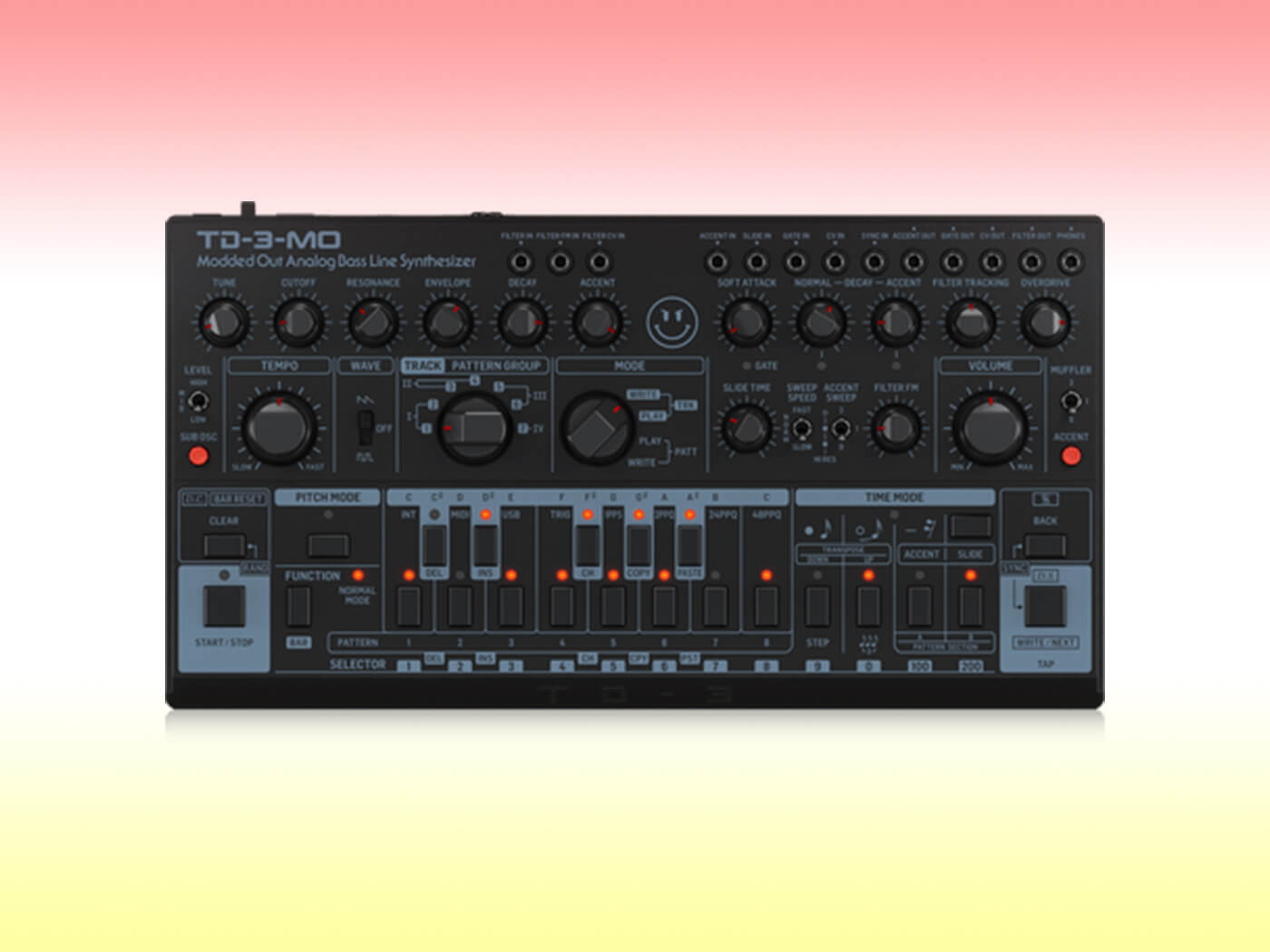
[products ids=”5xJHrDCgDuhABnKVVaTSOc”]
What do you think of when we say 303? Squelchy, distinctive acid basslines, old-school acid house, raves in fields, and of course the iconic smiley face, right? Well, Behringer knows this all too well and did a stellar job of recreating the legendary Roland TB-303 with its TD-3 synth. Even more impressive is the release of the TD-3-MO, its take on the revered TB-303 Devilfish Mod by Robin Whittle.
Get iconic sounds at a staggeringly affordable price and have endless fun making music when you pick up the TD-3-MO. It packs in a deep sub-oscillator alongside its main square/sawtooth oscillator, an expanded filter range with FM and overdrive controls, and further patching points so you can connect more gear.
Features:
- Modded interpretation of iconic bass synth
- One oscillator with sawtooth/squarewave waveforms
- All-analog VCO, VCF, VCA signal path design
- 4-pole resonant filter
- 16-step sequencer with 7 tracks and 250 user pattern slots
- Programmable accents, slides, filter FM, sub-oscillator, overdrive, and real-time parameter manipulation
- Price: $259
Korg Minilogue XD
[products ids=”4lhKV7DzshO4KhTmvjvAWf”]
Korg released the original Minilogue in 2016, and its enduring popularity led to the release of the Minilogue XD three years later. Retaining the sleek and minimal look of the original, the XD is a fantastic choice if you’re seeking a highly portable poly synth with advanced functionality.
A key difference between the XD and the original Minilogue is the addition of the powerful digital Multi Engine (taken from the Korg Prologue) alongside its analogue architecture, opening up a world of hybrid sound design possibilities. The XD’s polyphonic step sequencer has been upgraded too, while the expanded effects section includes modulation, reverb, and delay for further sound shaping.
In our review of the original Korg Minilogue, we highlighted its versatility and integration with other analogue gear like Eurorack and the Korg Volca series. These strengths are amplified in the XD, which adds deeper functionality while maintaining the approachable design that made the Minilogue a favourite.
Features:
- 37 keys
- Four-voice polyphonic analogue architecture with digital multi-engine
- Mono, Duo, Unison, and Poly voice modes
- 16-step polyphonic sequencer with motion recording
- Price: $599
Read our full review of the Minilogue XD
Modal Electronics COBALT5S 5-voice
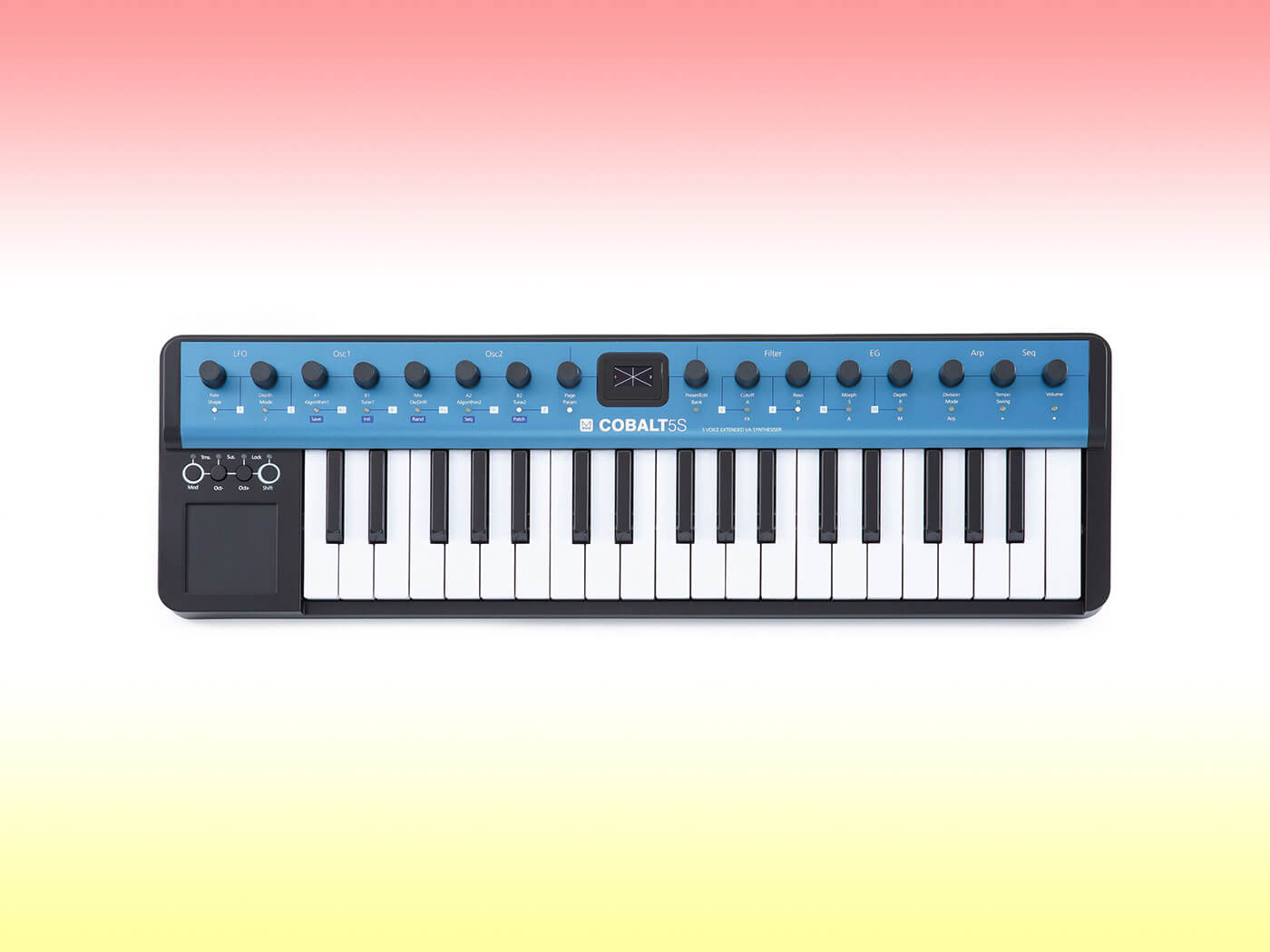
[products ids=”5vG38J7TKM5Nuqb5Z1njHw”]
Don’t be put off by the simplistic look of Modal Electronics’ COBALT5S 5-Voice synthesizer – it packs one hell of a punch. The smaller and more portable sibling to the Cobalt8, this five-voice polysynth is a solid piece of kit for its inviting price tag, with 37 keys, eight oscillators per voice, and 40 sound-shaping algorithms on offer. These range from ring mod, waveform morphing, cross modulation, PWM and more.
Yes, the COBALT5S might not display 8-bit figures dancing on a screen, nor will it recreate the northern lights in its dazzling backlit pads, or attract the stoned hardware synth hipsters looking to make their studio look good, but it will deliver. This incredibly versatile synth offers its users an unlimited array of analogue sounds inspired by analogue icons. Create swooping, emotional pads, grungy bass sounds and loads more for a delicious price.
Features:
- 37 keys
- 2 LFOs with 7 shapes to choose from
- 8 mod slots & 4 extra fixed modulation routings with 11 selectable sources and 41 destinations
- 32-step arpeggiator
- Five-axis XYZ touch-sensitive pad for pitch bending, mod wheel and more
- 300 patches with 200n factory presets
- Comes with free Modal app
- Price $449
Roland JU-06A
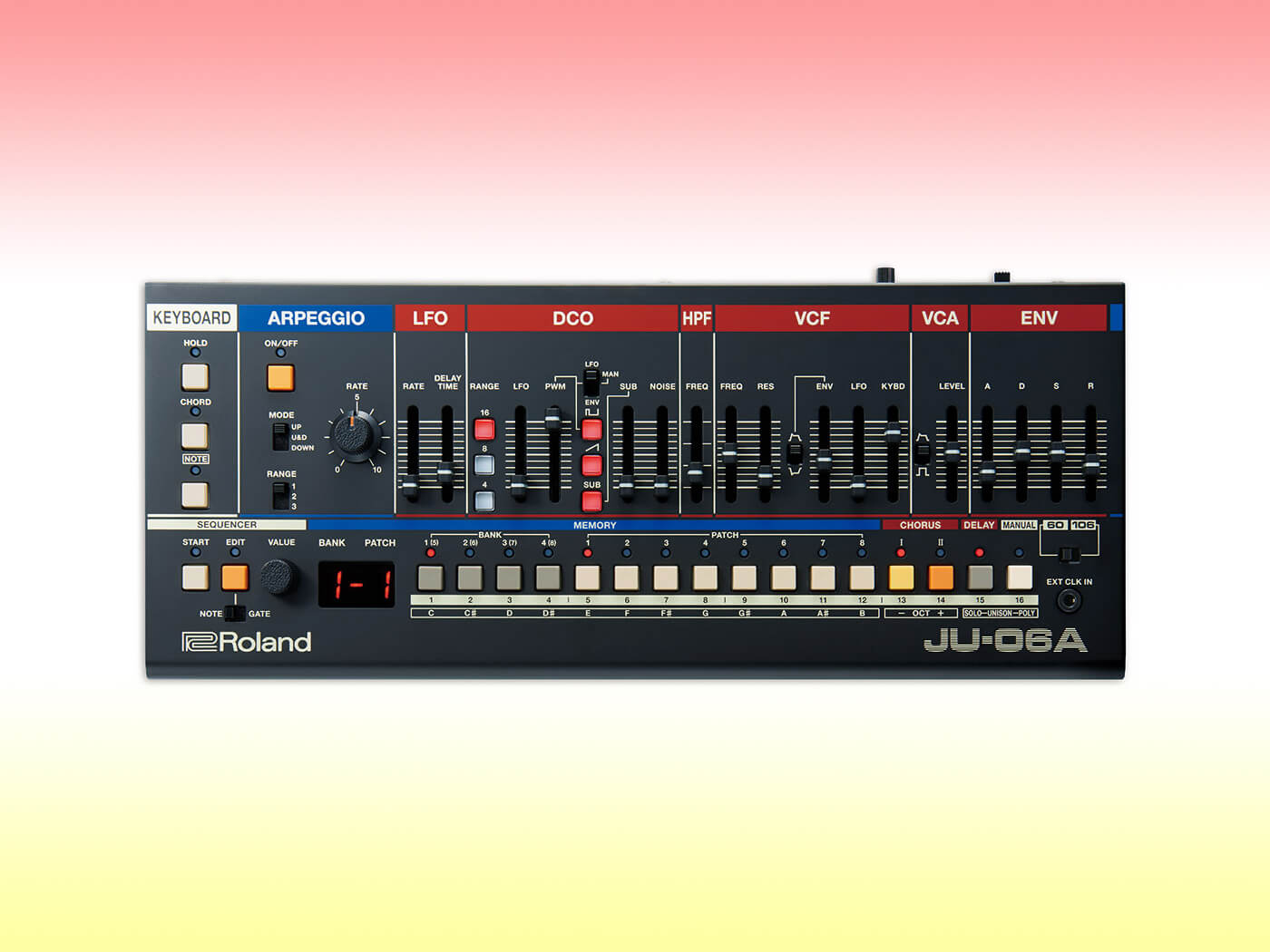
[products ids=”JwMJelzQZKjfKS3Z41L5k”]
The Roland Juno synths are tremendously sought-after pieces of kit, with a plethora of software emulations developed in recent years. Roland’s caught on and made the classic Juno-106 and Juno-60 available in the form of the Boutique JU-06A, with a much smaller form factor and lower price tag. You’ll get many of the frills from the original synths here, including the legendary Juno Chorus modes and arpeggiator. This synth is ideal for anyone looking for a Juno replica with awesome tactility.
In our review of the JU-06A, we said: “If you want a module which works well as an all-rounder but whose sound has lots of personality, you’ll find plenty to enjoy. Throw in its hybrid sonic engine, a capable, inspiring pattern sequencer, all the portability you could want (including battery power and an internal speaker) and the JU-06A has plenty to recommend it. It’s a great vibe machine too; when inspiration is low, it’ll get the juices flowing”.
Features:
- 4 voice polyphony
- Juno-60 and 160 ‘hybrid’ sound engines
- DCO, LFO, HPF, VCF, VCA and envelope stages
- Arpeggiator and pattern sequencer
- MIDI In/Out
- External clock input
- Headphone and line outputs
- Audio input
- Chorus and delay effects
- Price $399
Read our full review of the JU-06A
Arturia MicroFreak
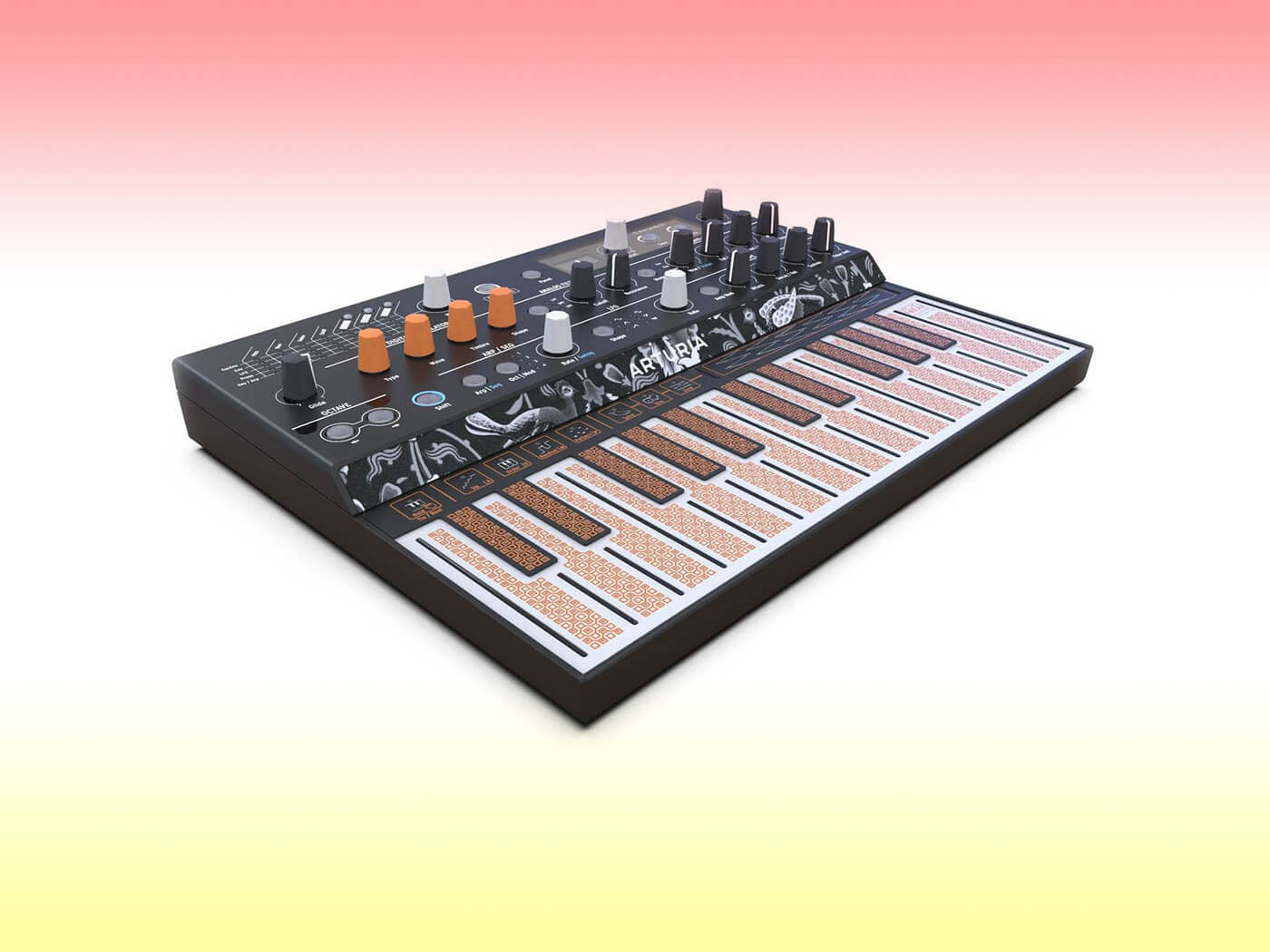
[products ids=”2cpDTXpxXt3kDJHeKmhNj9″]
Getting weird with Arturia’s erratic four-voice freak is a breeze, thanks to its versatile modulation matrix and 11 oscillator modes. The oscillator was created with some help from modular synth brand, Mutable Instruments, and sports subtractive-style waves, a wavetable, an FM-tone generator, among other awesome oscillator modes. This all feeds into a 12dB/2-pole state-variable analogue filter, which is a nice addition to the digital beast. The MicroFreak V3 brings more presets, more oscillator modes and more fun.
In our review of the MicroFreak, we said: “The MicroFreak represents very good value for money, providing basic synthesis possibilities alongside more complicated and highly inspiring digitised formats. Add this to the included analogue filter and comprehensive routing and modulation capabilities and you have a powerful synth in a highly compact form that is very appealing.”
Features:
- Versatile monophonic/paraphonic synthesizer
- Digital oscillator offers 11 voice modes
- Up to four voices available
- State-variable analogue filter
- Flexible modulation routing via the matrix
- Arpeggiator and sequencer onboard
- ADSR and cycling envelopes
- MIDI/USB connectivity
- Price $349
Read our full review of the MicroFreak
Roland Boutique SE-02
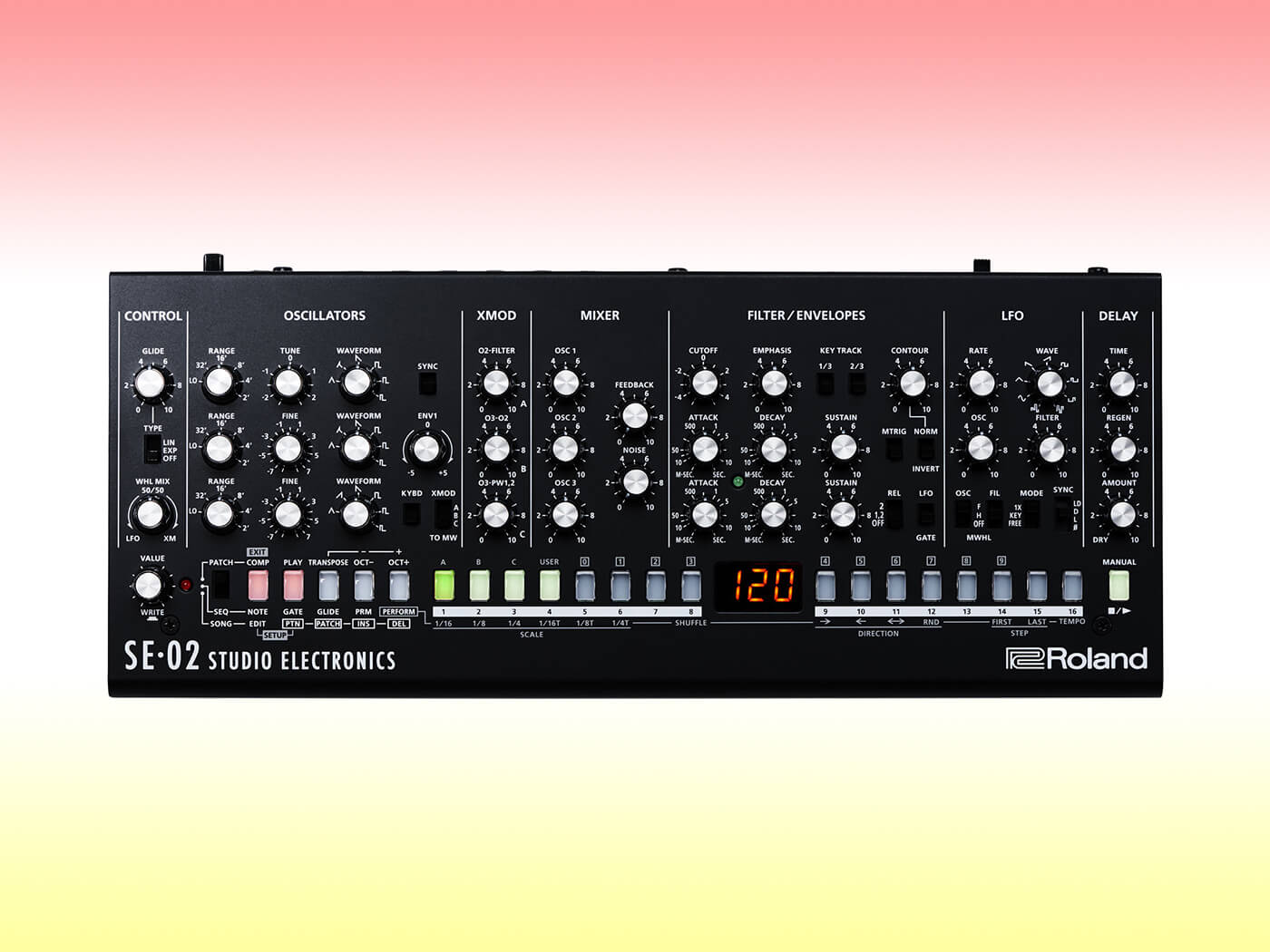
[products ids=”5G1RSA1xVpCfdkwlKOpAPn”]
Another one of Roland’s Boutique synths to consider is the SE-02, which comes in collaboration with Studio Electronics. The analogue monosynth boasts three oscillators, plus a noise generator, feeding into a fixed 24dB/octave low-pass VCF with envelope and keyboard tracking options. Three cross-modulators take you into new sonic territories, wildly warping waveforms, along with an LFO for filter and oscillator modulations and a delay section. The SE-02’s 16-step sequencer makes it easy to create patterns, featuring a glide control for smooth transitions.
In our review of the Boutique SE-02, we said: “There’s a lovely sonorous depth to the SE-02’s sound, which will just sit beautifully in a mix, but it also has the capacity to shriek in various ways. The filter sounds terrific; add in the levels of distortion available through the Feedback control and X-Mod, and you’ve got yourself a very flexible device full of wondrous sonic capabilities. So much so, in fact, you’ll probably just want to get your hands dirty and create great sounds.”
Features:
- Monophonic analogue synthesiser
- Authentic discrete circuit design
- Knob-per-function interface
- Lots of modulation possibilities
- MIDI, USB and CV connectivity
- Audio over USB
- 128 user-memory locations/384 presets
- Onboard sequencer
- Price: $449
Read our full review of the Boutique SE-02
Behringer Neutron
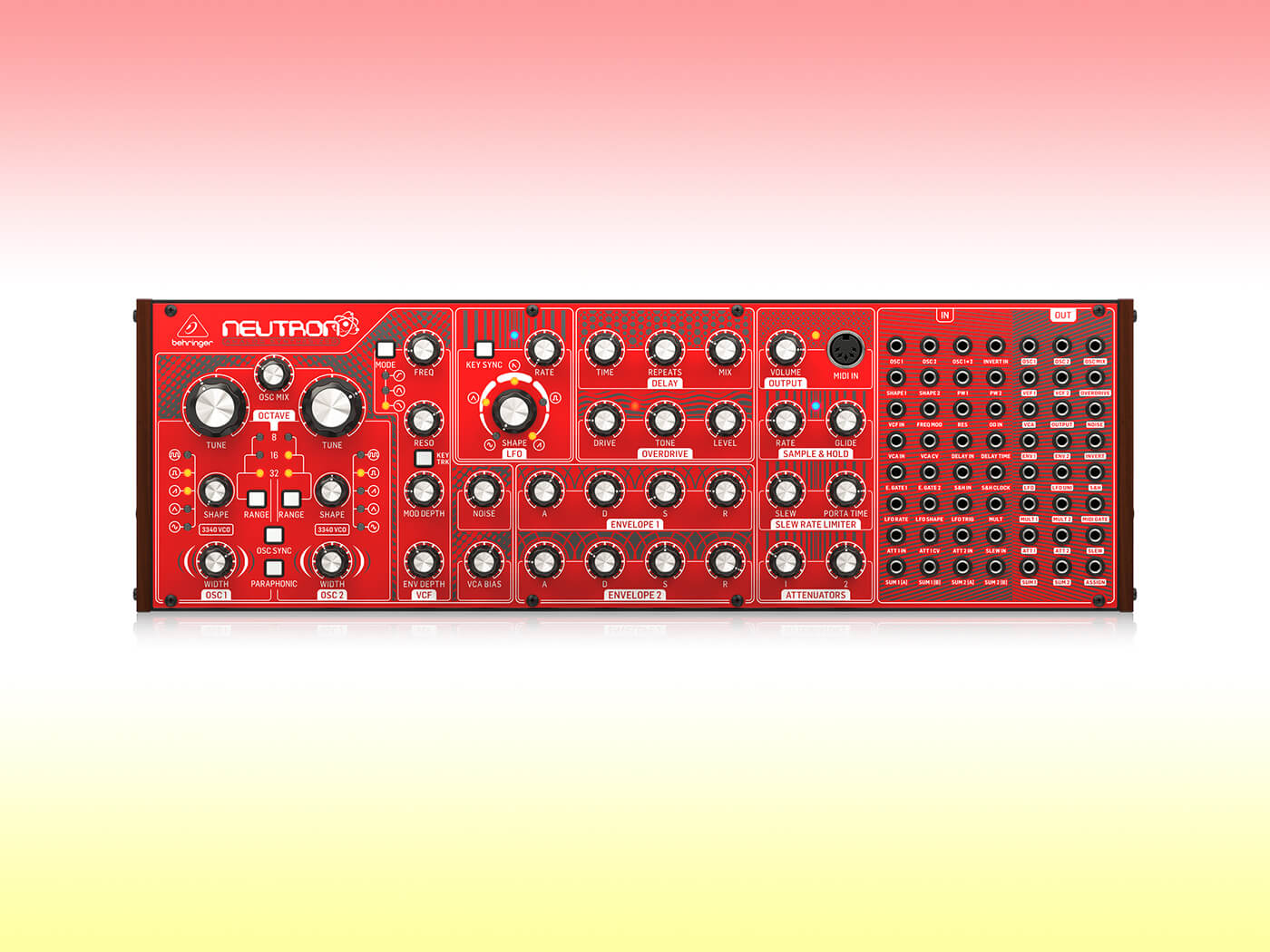
[products ids=”3VXXAUi4gONCmbZpJaSbf1″]
The Behringer Neutron isn’t a reproduction of a classic synth. Can you believe it? Built from the ground up, this is Behringer’s totally original semi-modular synth that gives you more ways to contort your sound and is a brilliant way to introduce yourself to the world of modular synthesis.
This offers a punchy, raw sound as a basis with tons of options to shape it into something unique. With 56 patch points and two oscillators, Neutron stands up against many fully modular synths, giving you fistfuls of hardware to play with. If you love hardware and are either a recent or seasoned collector, the semi-modular synth offers hours of music-making pleasure.
Also, be sure to keep an eye out for the Proton, a step up from the Neutron which Behringer is bravely dubbing “the most powerful and complex semi-modular synth ever designed”. Behringer really is pulling out all the stops.
Features:
- 2 voltage-controlled oscillators
- Noise oscillator
- 56 Patch Points
- Lowpass/Highpass VCF
- Filter and Amp Envelopes
- LFO
- CV I/O
- Delay & overdrive
- Price: $329
1010music Nanobox Lemondrop
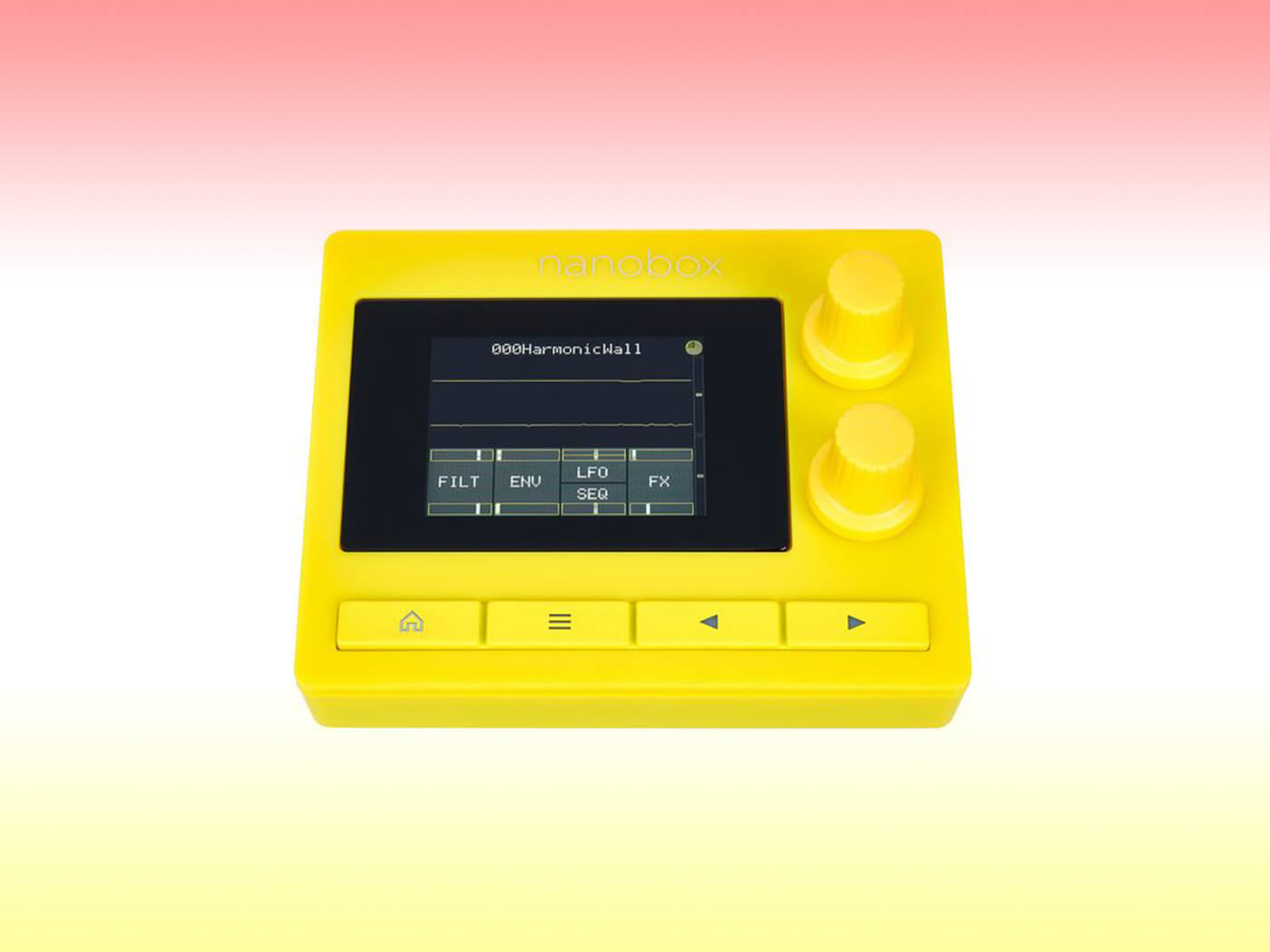
[products ids=”2tkVigiMa2DcejrJdZBxfH”]
A zesty little number is 1010music’s Nanobox Lemondrop. It’s a compact polyphonic granular synthesizer offering touch-based control. With four-voice polyphony, dual granulators, and an oscillator, it covers a diverse sonic range from lush pads to glitched-out textures.
Its touchscreen makes for hands on sound manipulation, while filters, envelopes, LFOs, and a modulation sequencer allow for detailed shaping. It’s designed for both tabletop and portable use, featuring a small form factor, USB power, and various connectivity options.
Features:
- X/Y control touchscreen
- 4 voice polyphony
- 2 granulators & 1 oscillator
- 2 filters, 2 envelopes, 2 LFOs, & 1 modulation sequencer
- 6 combinable onboard effects
- Price: $494
Read more about the Nanobox Lemondrop.
Yamaha Reface DX
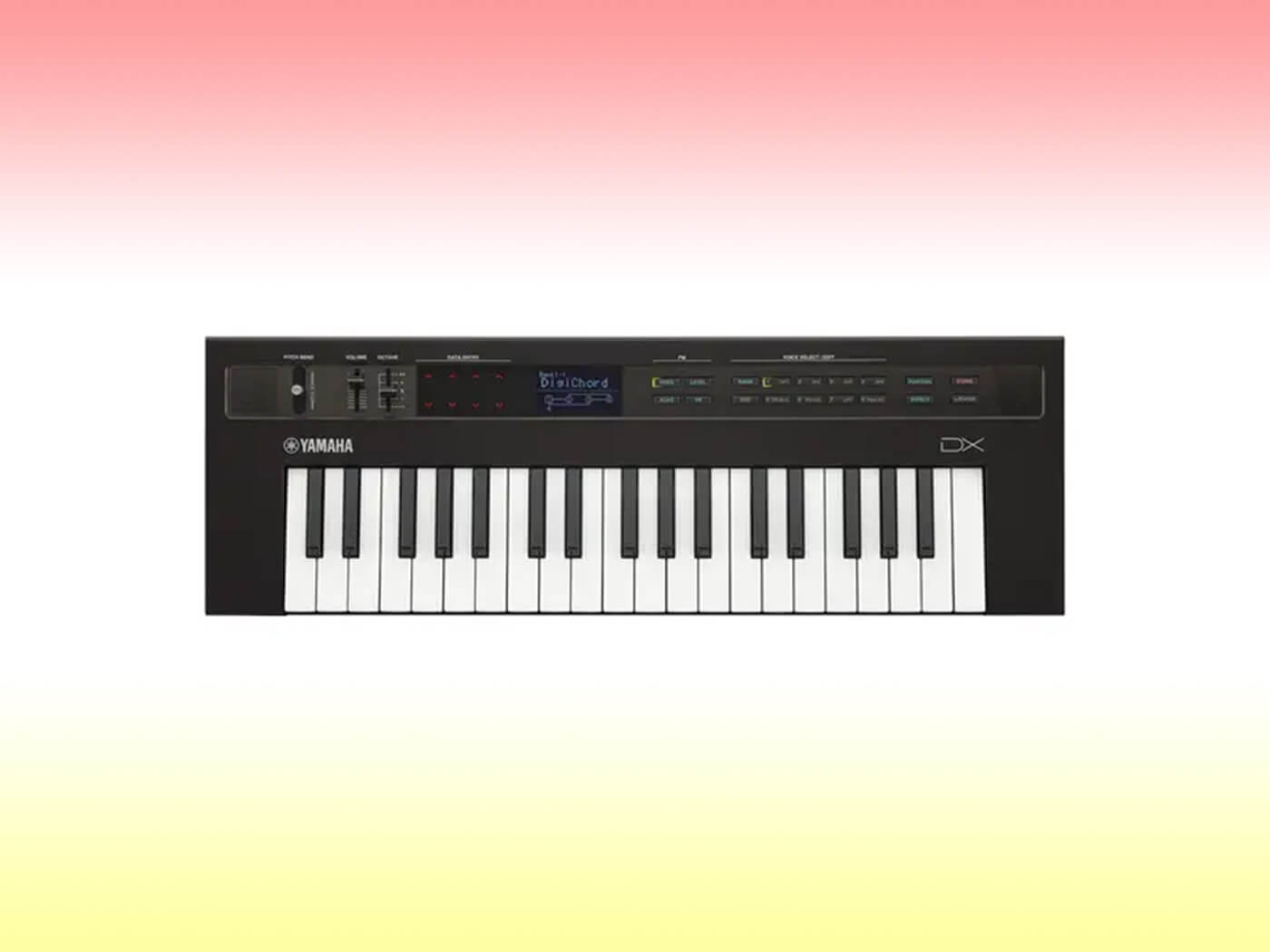
[products ids=”6A9fxm4CKreGmZd4xPS6yH”]
Yamaha’s DX7 is an FM synthesis pioneer, renowned for its ability to generate unique sounds and for its frustratingly complex programming interface. Four operators and 12 algorithms are featured in Yamaha’s DX reboot, the Reface DX. This is two operators less than the DX7, but a pair of effects processors still lets you create complex tones. A Phrase Looper lets you record up to 2,000 notes or 10 minutes worth of notes, and the screen will help you visualise your FM routing.
In our review of the Reface DX, we said: “What it does well is bring easy, hands-on DX sound mangling one step closer to reality, albeit a cut-down four-operator version of FM. We love that it offers a great taste of the original and what you can do with the sounds, especially in such a short space of time, and this overall level of ease of use is something you would never once associate with the letters ‘DX’.”
Features:
- Eight voices of polyphony
- 37 keys
- Effects: Distortion, chorus, wah flanger, phaser, delay, reverb
- 4-operator FM sound engine
- Onboard multi-effects for adding depth to your sound
- 32 memory locations
- Phrase looper
- Price: $299
Read our full review of the Reface DX
Make Noise 0-COAST
If you’re curious about modular synthesis but hesitant to jump into the deep end, a budget-friendly option like the 0-COAST from Make Noise is an approachable yet powerful entrypoint. As a semi-modular synth, it bridges the gap between fixed-architecture instruments and the open-ended world of modular systems.
Drawing inspiration from both East Coast and West Coast synthesis paradigms, the 0-COAST offers a fresh approach that brings together traditional, subtractive principles with more experimental wavefolding and modulation techniques that add harmonics to the signal.
Out of the box, you can start playing without patching, as the synth operates as a complete instrument. But once you’re ready to explore, rerouting the synth’s components with the patch bay opens up a wealth of possibilities.
Features:
- Semi-modular synth
- Offers both subtractive synthesis and wavefolding
- Can form part of a larger modular system
- Price: $499
Moog Mavis
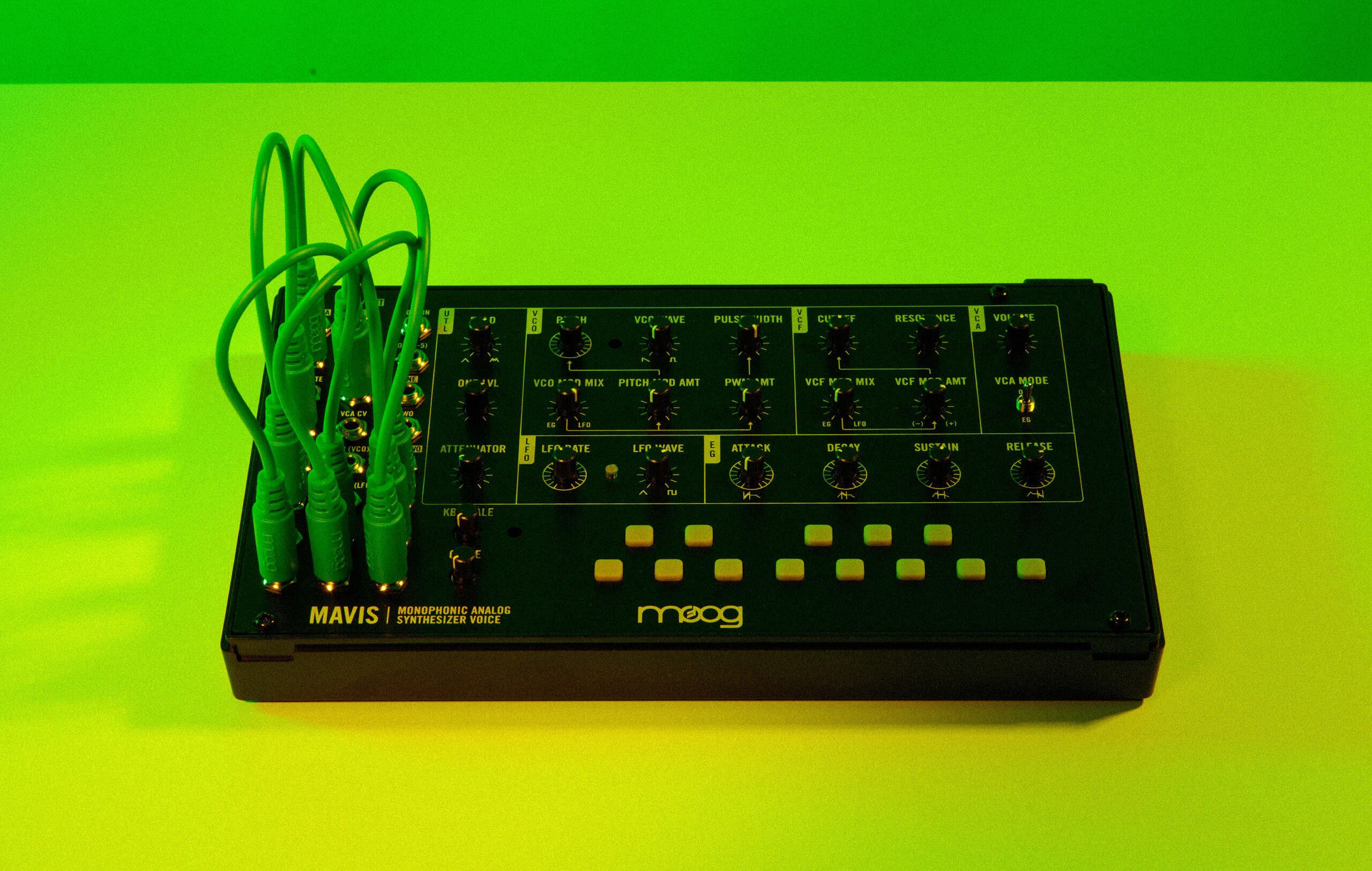
Want to get your hands on that creamy Moog sound without breaking the bank? The Mavis is a build-it-yourself analogue synthesizer kit that does exactly that — as long as you don’t mind getting your hands dirty putting it together.
Mavis features two oscillators, a full ADSR envelope, ladder filter, sample and hold, wavefolding, attenuators, mixer, mults, and other modules. So, not only is it a robust instrument in its own right, but it’s a solid basis for a modular setup too.
Features:
- DIY analogue Moog synth at low cost
- Dual oscillators, envelope, filter, and more
- Semi-modular architecture
- Price: $349
Read our full review of the Mavis
For more music technology gear guides, click here.
The post Best synthesizers to buy in 2024: 17 of the best hardware synths under $600 appeared first on MusicTech.





Recommended Comments
Join the conversation
You can post now and register later. If you have an account, sign in now to post with your account.